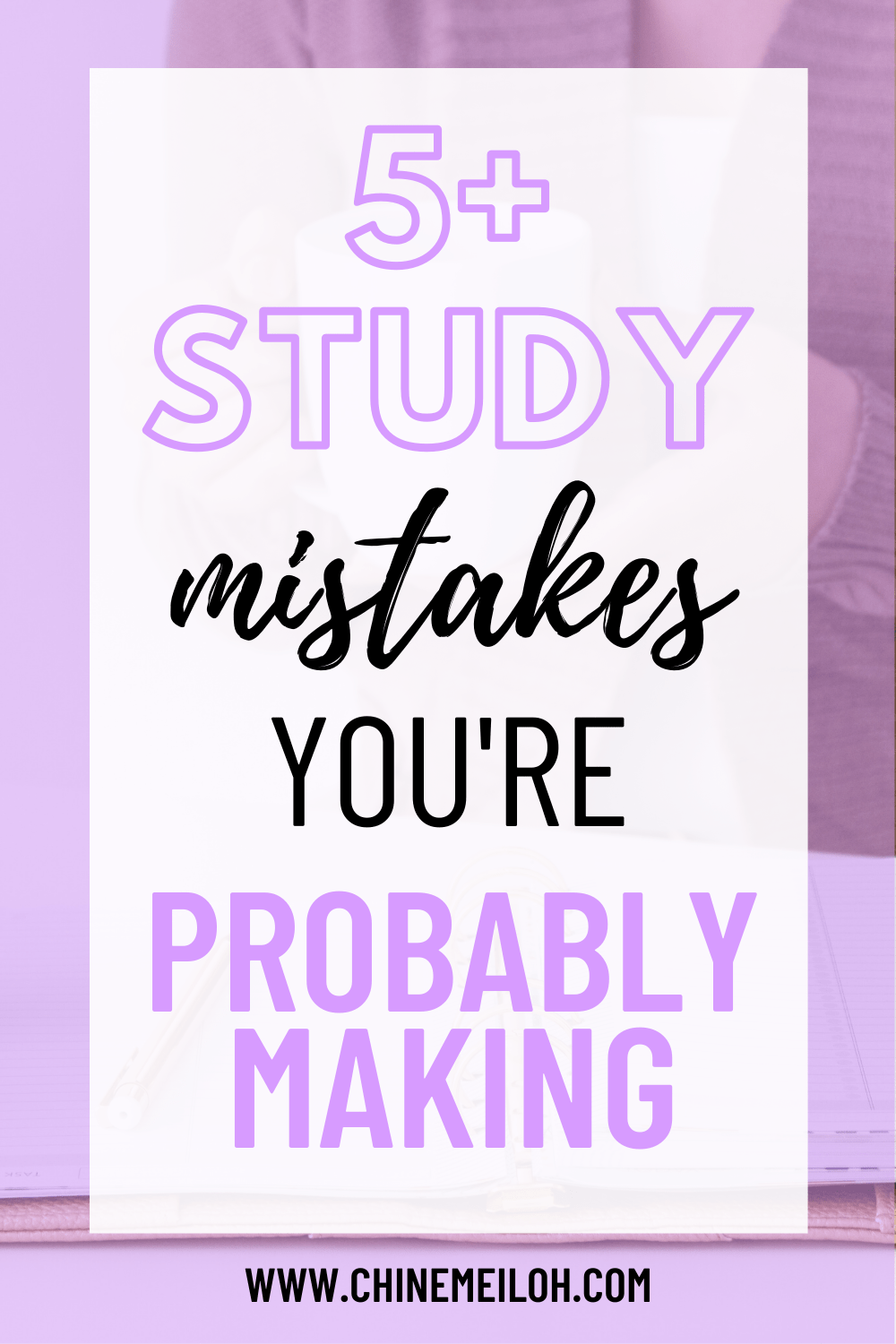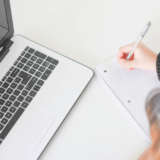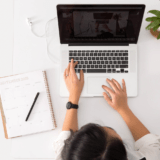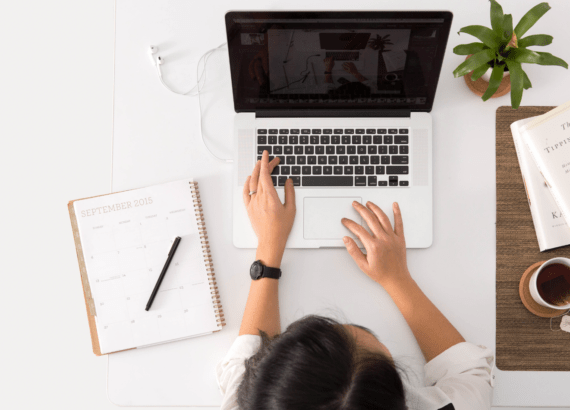Are you making one of these study mistakes? If so, this blog post is where you should be – I’ve staged a mini intervention, just for you.
I’m here to save you from these risky mistakes, by providing you with the cold, hard truths to studying, that you probably need to hear.
So many students are making these common study mistakes. The study methods that I’m about to dive into are the easy routes (understandably why so many students travel down these paths), but the useless routes. They don’t help your learning and they don’t work.
Luckily, you’re in the right place. I’ve compiled a short but handy list of study mistakes that you just have to know if you want to avoid them and study in the most effective way possible.
You want to be avoiding these inefficient study methods, so without further ado, here’s the tea:
Oh, hey! You there! Before we get any further, make sure you join my email list for news, updates, exclusive freebies and more!
![]()
1. Reading is not studying.
Do you often find yourself sitting at your desk and reading your textbook from cover to cover, and calling that studying? Um, no. If this is you, simply reading your textbook is NOT studying.
Let me tell you why. Reading is THE MOST passive way of learning I can think of. We all know that active learning is the best way to study efficiently, and reading and re-reading your books just doesn’t provide this.
Reading out of the textbook doesn’t engage your brain at all. Any information you pick up from that textbook will leave your brain within 30 minutes if you don’t engage with it. Unfortunately, reading is not going to provide that engagement for your brain.
From the book —> through the head —> and gone forever.
Don’t believe me? Well, psychologists’ research shows that simply reading from the textbook is a lousy way to learn. Let’s be real, students love to call reading studying because it’s easy. I mean, come on, I’m guilty myself! But it is NOT effective one bit.
When you read something for the first time, you’ll pick up a bit of information. If you re-read it, you won’t make any improvement in your learning. You won’t pick up any more information and nothing changes.
Fortunately, I’ve got a much better alternative to the weak revision method of reading your textbook. Focus more on active learning and active recall methods. This will actively engage your brain in the material and is therefore much more effective than reading from the textbook.
Before an exam, instead of burying your face into the textbook, try quizzing yourself with flashcards, or drawing some diagrams, or even self-testing with past papers and practice questions.
These are all active learning methods that are proven to boost the way you study significantly.
![]()
2. Copying from the textbook is not studying.
Let me just repeat this for the people in the back row. Copying from a textbook is not studying! This is also an incredibly passive way of learning, and here’s why you shouldn’t do it:
Copying from the textbook is not an effective strategy for learning the content – all you’re doing is transferring the words into your notebook.
I’m, again, guilty of this (I stopped this a long time ago so don’t worry!) so I know how ineffective it is. I’d often find myself having absolutely no clue about what I was writing, but I’d just say “oh well” and keep copying down what I saw.
Copying is alright to some extent, but only if it’s the first step to comprehension. It should not be used as a study/revision method. This is because your textbook could have all the information in the world, but it won’t mean a single thing if you don’t understand it.
I’m starting to like using scientific evidence to make my arguments sound more probable, so here it is: research has shown that copying from the textbook only mentally stores the information in your brain for a short period of time. The main problem with this is that it typically makes random access (aka retrieval of information) quite slow and hard to do.
I didn’t really consider this before I researched this topic, but I realised how true this study was when looking back at my old revision methods. If I were to quiz myself on what I’d just copied from the textbook, it would take me quite a while just to retrieve one fact.
Here’s an easy solution: if you want to use your textbook for content reference when studying, that’s absolutely fine, but try to actively summarise the information instead of copying it down.
>> RELATED POST: 13 Tips on How To Study Smarter, Not Harder
Summarisation is a fantastic method for memorisation because your brain is making the conscious effort to understand the content, identify the important bits, and put it into your own words. This is why it’s so effective.
This can be done in many ways, such as bullet pointing your notes with only the condensed information, or writing summarised flashcards.
I especially love making summarised flashcards because the small contents of the A6 cards literally forces you to include only the necessary information (also, I was always running out of these flashcards, so I quickly developed the skill of doing this method or I’d have no more revision resources!)
Try summarising the information, instead of blankly copying it down, and you’ll find you understand and remember the key points a lot better.
![]()
3. Multitasking isn’t possible.
Sorry to break it to you, but multitasking is a scientifically proven myth.
Okay, I’m kinda sceptical about this one because I’ve believed for so long that multitasking is 100% possible, and I don’t really want to believe otherwise.
However, studies have confirmed that there’s no such thing as multitasking, and now that I look at it, it kinda makes sense.
If you’ve got a bunch of tabs open in your browser, one for each subject, and all your textbooks are splattered about your desk, you’re probably “multitasking”. You’ll soon realise that it doesn’t work.
Multitasking is the ability to screw everything up simultaneously. Don't multitask. Share on X
Here’s the cold, hard truth: if you think you’re getting more done by splitting your attention between two things, you’re wrong. You’re actually getting less done.
Let’s put it like this – you could put 100% of your focus into one task and get it done quickly and efficiently, or you could put 50% of your focus into two tasks, so you won’t get through them as efficiently, but at least you’ll be doing them at the same time. Which one would you choose? I don’t know about you, but the first option is definitely the one I’d pick!
The human brain cannot physically perform two tasks at once (especially the demanding ones, like studying, which require you’re undivided attention). When multitasking, you’re just switching between the two tasks really fast.
A much more effective alternative is to focus on just one thing. Get it done to the best of your ability, and then move onto the next. There’s no point trying to split your time to save time, because you’ll end up wasting it. Period.
![]()
4. You can’t run away from a problem.
Let’s be real. Running away from our problems kinda fixes the problems. It’s the easy way out, and it works. At first.
You may believe that your problems are gone for good if you run away from them, but they do eventually come back to haunt you.
Now, you’re probably wondering, “Where is she going with this?” Here’s the deal. If you’re struggling with a subject or topic, running away from it actually isn’t going to fix anything. It will probably cause more problems in the near future, to be honest.
What I’ve learnt from GCSEs is that the topics you revise really well often barely pop up in the exam, and the ones you just skimmed over because you weren’t bothered with it or you found it hard, hit the exam like the truck. It’s not fun.
Running away from any problem only increases the distance from the solution. The easiest way to escape from the problem is to solve it.
My point is, if you find something difficult, take the time out to fully understand it, and confront it. Tackle those challenging areas by reviewing your notes, asking for help from teachers and peers, or doing extra research into the topic.
Asking for help is a great way to resolve the challenging areas, as other people are one of our most useful resources. Ask your teachers for help – they probably know the subject a lot better than anyone else. You could also ask your peers, parents, siblings. Anyone who’s available to help you out with a difficult topic, make use of them!
>> RELATED POST: 8 Game-Changing Apps That You Need To Ace Your GCSEs
After this, test your knowledge, and make sure you understand the topic. Self-test with practice questions, and self-assess to identify your weak areas and areas for improvement. Then repeat, until you’ve mastered the topic. This is the best way to remove your difficulties, and you’ll feel much better tackling them face-on rather than running away!
Lastly, when confronting those weak areas, make sure to go in with a positive mindset. Negative mindsets can leave you feeling tired and frustrated very easily, and you won’t learn anything new. A positive mindset, however, will help you absorb the information with patience and resilience. Try it out, you’ll see how effective a positive mindset is to your learning.
![]()
5. You can’t give up.
When unmotivated, it’s so easy to forget why you even started – it’s so much easier to give up.
I totally get it. I mean, we’ve all been there, right? But the final, study mistake is giving up.
Remember why you started. Don’t give up, find a way.
Make sure you remind yourself daily of your goals. Do you want to achieve a certain grade, or get into a particular university? Perhaps you just want to make your parents proud.
Writing down your goals is a great way to remind yourself of why you started striving and aiming for those goals.
The only way you’ll ever get to where you want to be is if you don’t give up. You’re a girl boss (or boy boss), remember? So you got this!
>> RELATED POST: 10 Top Tips on How to Study When You Feel Unmotivated
![]()
Your Takeaway…
To sum everything up, try avoiding these common study mistakes. They’re ineffective and won’t help your learning at all.
I put a few solutions at the end of each point, so follow those and you’ll see a HUGE difference in your study methods. To recap, just in case you forgot:
- Reading is not studying.
- Copying from a textbook is not studying.
- Multitasking isn’t possible.
- You can’t run away from a problem.
- You can’t give up.
If you enjoyed this post, you might also enjoy some of these posts too!:
- 10 Top Tips on How to Study When You Feel Unmotivated
- 8 Game-Changing Apps That You Need To Ace Your GCSEs
- “Study Smarter, Not Harder”: 13 Tips On How To Study Effectively
If you have any comments, questions or contributions, please feel free to comment them down below! I’m always checking and responding to comments!
Thanks for reading and have fun studying!

![]()













